 Written by: Marie-Soleil Smith, PhD Candidate, Côté Lab (right)
Written by: Marie-Soleil Smith, PhD Candidate, Côté Lab (right) & Nancy Yang, MSc Student, Côté Lab (left)
& Nancy Yang, MSc Student, Côté Lab (left)
Edited by: Kristine Ho, Communications Coordinator
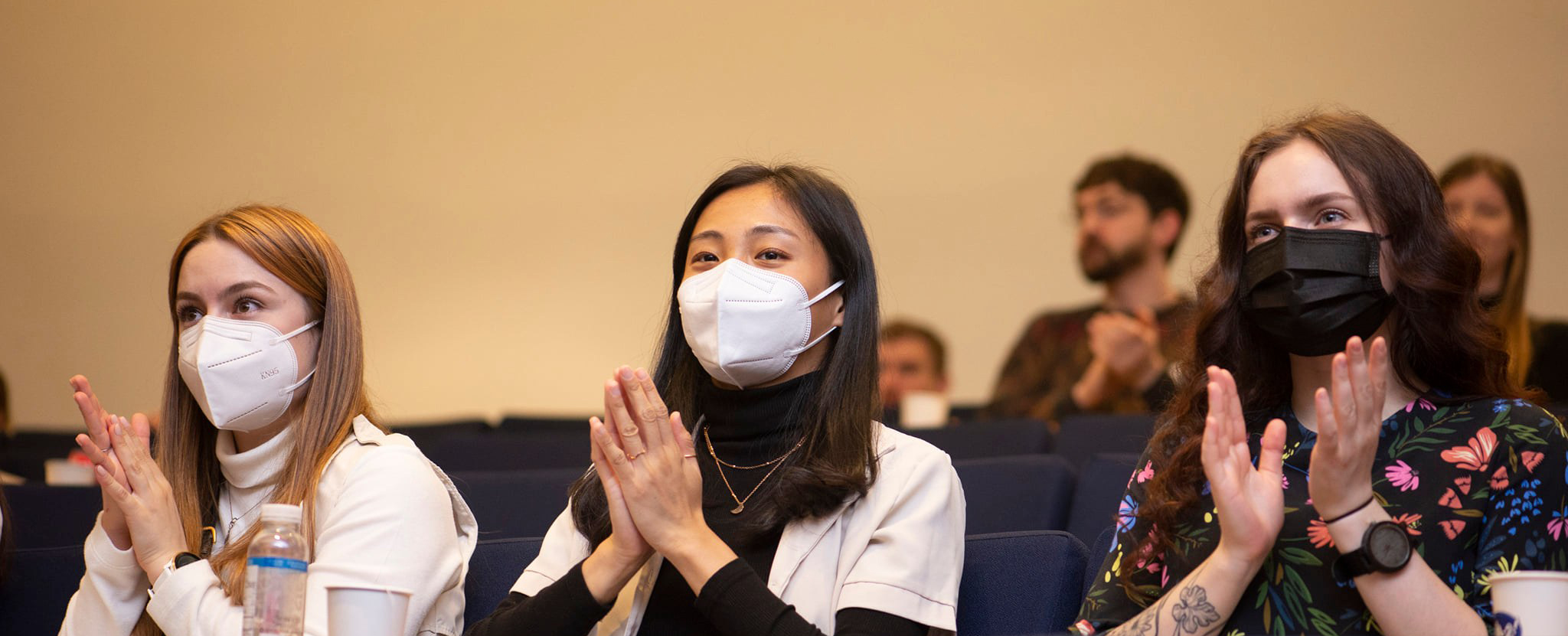
Writers Marie-Soleil (left) and Nancy Yang (middle) attend the symposium along with their lab mate Tetiana Povshedna (right)
On April 6, 2022, the 11th annual Norman Bethune Symposium returned to UBC Robson Square, in its first-ever hybrid format since the beginning of the COVID-19 pandemic. The symposium honours Dr. Norman Bethune, a pioneer in the field of blood transfusion during the Spanish Civil War. This year, the hard-working team at the Centre for Blood Research (CBR) used two different platforms to allow in-person and virtual attendees to engage with speakers and poster presenters.
The symposium was packed with talks from celebrated international and local scientists, clinicians, trainees, and a moving patient testimonial. All speakers eagerly highlighted recent transfusion-related research, with a special theme of personalized medicine recurring throughout the talks.
- Watch presentation recordings from the 11th Norman Bethune Symposium
- Read the Canadian Blood Services’s blog about the event: “Norman Bethune Symposium 2022 – trainee reports”
A morning of vibrant research
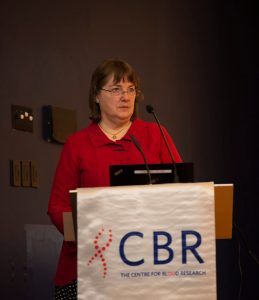
Dr. Dana Devine provides opening notes at the Norman Bethune Symposium 2022
Dr. Dana Devine, CBR Director and Chief Scientist at the Canadian Blood Services, delivered the opening remarks. She highlighted Dr. Bethune’s scientific contributions, his involvement with the Communist Party of Canada, and his eventual travels to China, with such an eminent status that Mao wrote a poem about him.
Following the introduction, two international speakers shared their research. First, Dr. Andreas Greinacher from Greifswald, Germany, spoke about cases of COVID-19 vaccine-induced thrombotic thrombocytopenia in young people. He investigated vaccine components that could be involved, fueling a vibrant question period, no doubt due to the present-day relevance and implications of his work.
Next, Dr. Jeanne Hendrickson, Director of Transfusion Medicine at Yale University School of Medicine, talked about her work on red blood cell (RBC) alloantibodies, particularly among people with a higher transfusion burden, like those living with sickle cell disease. She was the first speaker to introduce a soon-to-be recurring theme: the benefits of personalized medicine. Dr. Hendrickson emphasized that standard screening panels could be inadequate depending on the donor population, and that safer transfusions require representative panels. She also discussed how the dangers of RBC alloantibodies could be greatly reduced by developing a US-wide RBC antibody registry, and cited an existing, successful registry in the Netherlands that is believed to have improved transfusion safety by 50%.
Right before the end of the first session, six poster presenter trainees went on stage to give fun, succinct “elevator pitches” that enticed the audience to visit their posters during the breaks.
UBC researchers take centre stage
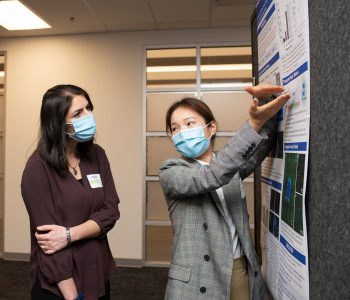
Poster presenter Pan Deng shares her research to attendee and oral talk presenter Dr. Narges Hadjesfandiari
Following the snack and poster break, three UBC trainees presented their research. First, Helen Chen discussed her work to develop a hydrophilic polymer coating for platelet bags, to prevent bacterial growth and improve transfusion safety. Next, Steven Jiang presented on the role of platelet signaling in rheumatoid arthritis, an autoimmune disease characterized by the role of fibroblast-like synoviocytes. Then, Massimo Cau introduced “Counterflow”, a technology developed by the Kastrup Lab to manage severe bleeding that, in their recent study, increased survival compared to fluid resuscitation in a swine model of non-compressible truncal hemorrhage.
Dr. Angelo D’Alessandro from the University of Colorado and Dr. Hongshen Ma from our very own UBC then both gave talks about RBC storage issues, reiterating the need for personalized medicine. Dr. D’Alessandro highlighted that blood, like people, may age differently, and thus not all RBCs will age the same in a blood bag. He discussed how donor habits such as smoking, drinking, diet, and drug use can impact stored RBC quality. Dr. Ma similarly highlighted need to predict RBC circulation time, using deformability – as measured by a microfluidic ratchet device – as a proxy. There are differences between donors and their blood units, which again could allow for some degree of personalized medicine in patient-specific allocation of transfusion blood.
After lunch, we were treated to three more trainee talks. Erik Lamoureux’s talk provided an important machine learning angle to the RBC deformability project introduced by his supervisor, Dr. Ma. Next, we heard from Dr. Narges Hadjesfandiari of the Devine lab, who highlighted the importance of considering blood donor proximity to heavy metal mines and donor age prior to transfusion. Elevated levels of heavy metals like lead in donor blood are problematic, and especially so if transfused into infants. The final trainee, Ashley Clarke from Dr. Prism Schneider’s lab at the University of Calgary, discussed the role of major orthopedic fractures and the associated increased risk of blood clots.
A focus on personalized medicine
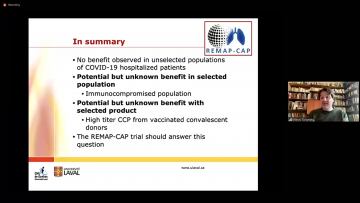
Dr. Alexis Turgeon summarizes findings from the first REMAP-CAP trial, and highlights next steps
While the next four speakers covered a variety of topics, they emphasized a central theme: the clinical relevance of personalized medicine. Dr. Mark Yazer from the University of Pittsburgh discussed the necessity of pre-hospital transfusions to save lives following an accident. He introduced low titre group O whole blood as a means to provide balanced resuscitation very quickly while waiting for follow-up personalized transfusion. Following this discussion, Dr. Maureen Hoffman from Duke University discussed the pros and cons of using emicizumab as a treatment for hemophilia A. This disorder is characterized by factor VIII deficiency that can be treated with either a bypassing agent or the novel non-FVIII therapy emicizumab. Although this novel therapy acts similarly to FVIII, a small sample has indicated a possible association between emicizumab and thrombotic microangiopathy.
Next, we heard from Dr. Mark Belletrutti from the BC Children’s Hospital. Dr. Belletrutti brought attention to the vast amount of platelet research that has occurred in Canada over the past ~40 years and highlighted rare platelet disorders such as the Quebec Platelet Disorder and Glanzamann Thrombasthenia. The last presenter of the session, Dr. Alexis Turgeon from Université Laval, presented results from the REMAP-CAP trial on the use of COVID-19 convalescent plasma in hospitalized patients. There was no effect of convalescent plasma compared to controls, but he hypothesized that a suboptimal product, wrong timing of product administration, or wrong populations could potentially explain the findings. He concluded by describing the next REMAP-CAP arm with a more targeted approach, using high titre convalescent plasma from vaccinated donors in immunocompromised patients who respond poorly to vaccination.
Wrapping up with a moving patient talk
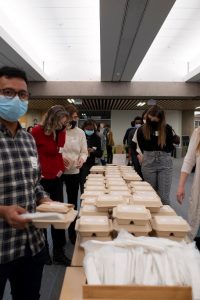
Attendees mingle and partake in food, drink and socializing after the talks at the Norman Bethune Symposium 2022
The last set of talks was presented by another group of outstanding trainees. Dr. Sylvia Ighem Chi from Canadian Blood Services discussed identifying S. aureus exotoxins as a potential biomarker for bacterial contamination, to prevent the transfusion of infected products. She demonstrated how whole genome sequencing, RNA-seq, RT-qPCR, and protein identification can all be used to identify contaminated products. Roger Kou, an undergraduate from McMaster University, presented his findings from a systematic review on transfusion strategies for myocardial infarction. The last speaker, Dipon Saha from Dr. Dieter Bromme’s lab, discussed the use of a salvia miltiorrhiza (red sage)-derived inhibitor in the context of SARS-CoV-2 infection.
Dr. Erica Harris, a patient speaker, concluded the talks by sharing her miraculous health journey. Throughout her leukemia diagnosis, unsuccessful chemotherapy, terminal 2-month life-expectancy prognosis, spontaneous remission, lung transplant, and subsequent life-threatening infections, her will to live remains strong and unwavering. If you want to hear more from this incredible woman, check out the Rise Today Inspirational podcast.
The day drew to an end with the best poster award presented to two trainees. Congratulations to Lisa Yamaura for her virtual poster investigating platelet contribution to hypercoagulability in patients with metastatic bone disease, and Pranav Shrestha for his in-person poster investigating the low-cost screening of sickle cell disease and β-thalassaemia in Nepal.
We would like to say a big thank you to the sponsors of the event as well as to the organizers, speakers, and attendees who all played a vital role in the success of the event, as we slowly begin to reintroduce in-person conferences.
The Centre for Blood Research would like to thank our event sponsors, without whom the 11th Norman Bethune Symposium would not have been possible: Pfizer, the Naiman-Vickars Endowment Fund, Bayer, the Canadian Blood Services, and GRIFOLS.
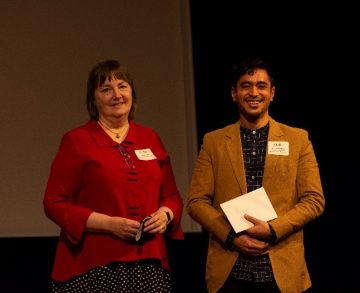
Poster winner Pranav Shrestha (right) on stage to receive his prize for the best in-person poster from Dr. Dana Devine (left)
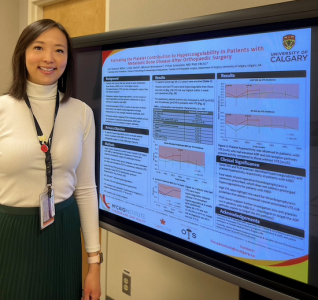
Lisa Yamaura stands next to her winning poster, which was voted as the best virtual poster


